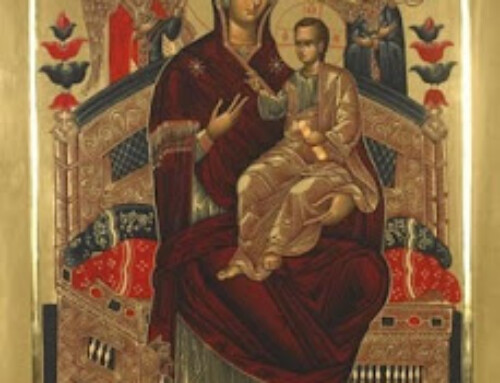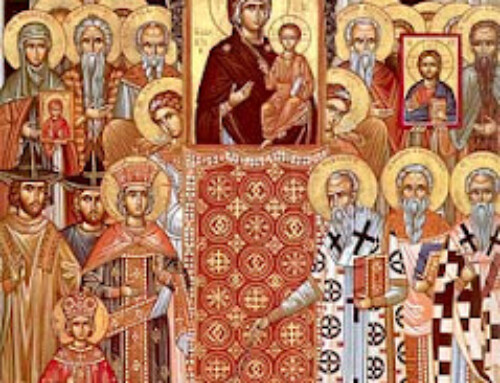Word Magazine June 1968 Page 13/15
TURN NOT THY FACE FROM ME,
O LORD
By Father James Meena
An Open Letter To Orthodox Christians In the Teaching Profession
Beloved Brothers and Sisters in Christ:
This letter is addressed to all who are talented and trained and devoted to the art of teaching in public schools. A question! Where are you going with all that talent and training? What are your purposes? Whom do you serve?
It is quite likely that you chose to be a professional teacher in order that you might contribute something good and worthwhile to the young, malleable minds which you would be instructing.
The person who follows the teaching vocation is usually idealistic, concerned and enthusiastic. He wants to make a positive contribution to the intellectual growth of his society. He is willing to face all sorts of challenges, makes any sacrifice in order to serve the cause of the future.
He usually attends college for from four to six years acquiring a degree and accumulating scores of credits on the graduate level. He enters his chosen profession vigorously, hopefully, energetically, with a great deal of imagination. He faces his first class with almost the same kind of courage described in the legends of knights-errant, willing to combat any villain or fierce dragon in order to rescue the “fair maiden” of young minds from captivity. (Some succeed. Some don’t.)
He jousts in the lists of administrative red tape, spurs the valiant steed of his ideals forward, drives the sharpened lance of his superior knowledge against the unyielding shields of the system and ….. all too soon ….. comes away from the arena by the same door wherein he went. But now, something is different.
The ideals, once bright, are now clouded. The hope for “what ought to be” is replaced by a realization of “how it really is.” Enthusiasm is
replaced by routine. Stimulating challenge is replaced by drudging routine. What was once a vocation is now but a job. That which was a dedication worthy of any sacrifice now becomes a profession in which one is overworked and underpaid. A teacher once dedicated to the classroom now becomes ambitious for the more lucrative and prestigious
administrative office.
Some of you know that I have come pretty close to the truth of the matter. In any case, it is not my purpose nor my desire to be hyper-
analytical about your chosen work. You are doing a great thing and without you there is little or no hope for the future of this great country of ours. I am not adding my voice to those of your critics and detractors. But I am trying to make an important point.
Throughout our archdiocese I have heard one continuing complaint: “We cannot get enough help from our professional teachers. When they are asked to teach in the Church School, professionals usually reply: “I teach all week, I don’t want to teach on Sunday. I’ll do something else.” (They usually do nothing else.) It is because of this type of response (which I received many times as a Pastor) that I write you this letter.
I am not going to admonish you to do on Sunday what you are doing all week because that would not be fair. But I want to point out that what we ask you to do in your Church School is in no way related to what
you are doing professionally.
In your profession you have a responsibility and relationship for a
relatively brief time with the students you teach. In your Church your responsibilities and relationships are greater and longer lasting.
Your day-to-day relationship with your students is entirely different from the relationship you would have with the children of the Church. The one relationship is professional, the other is personal. The one is a limited relationship, the other is unlimited. The one is restrained, the other is free. One deals with the mind (and maybe with the character) while the other deals with the whole man. In the one you are “The Teacher” — a member of the establishment while in the other you are “A Brother or Sister in Christ,” a member of the Family of God.
Just a brief aside. The Orthodox Church has never conceived of Herself as being God’s Institution. Rather, we have resisted that trend, which is so prevalent in Western Churches, that trend which so de-personalizes the Church. The one salvation of our existence throughout centuries of suffering has been our conviction that Christ established us, His Church, to be the Family of God and He has redeemed us as His brethren.
God is our Father, not our senior executive. Therefore, our people, clergy and laity alike, relate to one another as brothers and sisters, fathers and sons, with all the love, the emotion, the loyalty, and yes, even the bickering that such a family relationship implies.
So, then, if we ask you to assume a role in the life of the Church School we are not asking you to bring professional attitudes with you into the program. We are asking you, instead, to take up the challenges and responsibilities implied by your status as an adult, proficient and trained in teaching, and to share your life with your younger brothers and sisters in the Family of God.
Your Church calls upon you to share in the raising of the young. They are your responsibility as they are mine, for they, like yourselves, are citizens of the Kingdom, future Disciples of Christ. If one of them matures in virtue, we share in that virtue. If, however, a child grows to be a sinful reprobate, we share in his condemnation unless we have done all we can to help him grow in the faith. Today, probably more than most other times in history, our responsibilities to the new generation is being made clearer every day by the events surrounding us.
I want to stress again that there is no relationship between what you do all week and what I am asking you to do on Sunday. You have a gift. It is a gift given you by God and developed by your untiring efforts and study.
The Psalmist cried, “Turn not Thy face from me, O Lord.” Will our children utter these same words because we are hiding from them the face of God which is reflected in every believing member of the
Church? It’s your move.
Love In Christ,
Father James C. Meena




